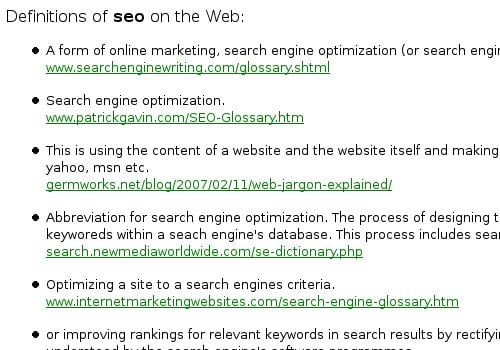
11 Tips for Appearing at Google Definitions
The author's views are entirely their own (excluding the unlikely event of hypnosis) and may not always reflect the views of Moz.
Google has got lots and lots of uses, and one of them is to define words. It can be done either by typing in "what is keyword" (only 1 definition will appear), or by typing "define: keyword".

Google defines this function on their patent as:
A system and method for providing definitions is described. A phrase to be defined is received. One or more documents, which each contain at least one definition, are determined. The phrase is matched to at least one of the definitions. One or more definitions for the phrase are presented.
What should you do if you want your website to appear as the one that defines keywords? Just follow these 10 simple tips:
- First, put the word to define, followed by the definition.
- Make the definition unique.
- < p >, < tr >, < li >, and < br > are treated as separators between definitions.
- Put the keyword to define and the definition inside the same paragraph. These have to be the only words in that paragraph, or use < dl >, < dt > and < dd > to specify lists of definitions; these are HTML tags.
- Pagerank of the document where you list the definition will make your definition rank higher than others.
- Differentiate the keyword to define by using < b >, < strong >, < em >, < code >, or < span >.
- Separate the keyword to define from the definition with a : or -.
- Use the words glossary, definitions, dictionary, what is, and canonical forms of those as Title tag, heading tags, and on the URL.
- Remember to put more than 5 definitions per page; if not, they will be discarded.
- Don't start a definition with the word "see" or it will get discarded.
- Don't capitalize the first letter of the definition.
If all the tips are taken into consideration and you create your glossary by what you have read here, you should have no problem in appearing on the next keywords you define.
This post was written by Esteban Panzera



![How to Optimize for Google's Featured Snippets [Updated for 2024]](https://mozpro.click/images/blog/banners/599c98d541a541.28015161_2021-03-30-231401.jpg?w=580&h=196&auto=compress%2Cformat&fit=crop&dm=1617146041&s=bcfded4bdc1de1792b6efcfd16b9152f)
Comments
Please keep your comments TAGFEE by following the community etiquette
Comments are closed. Got a burning question? Head to our Q&A section to start a new conversation.